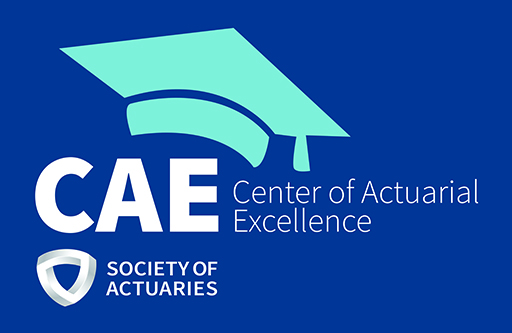Introduction
- The University of Connecticut’s actuarial program is a vibrant program for undergraduate, master’s students and PhD students majoring in Actuarial Science.
- It is one of the leading actuarial science programs in the country and the only one of its kind in New England.
- For PhD students, UConn offers a unique blend of rigorous theoretical framework with practical grounding in problems of intense emerging interest in the marketplace.
- The Janet and Mark L. Goldenson
 Research Center for Actuarial Science provides a unique window into emerging problems in actuarial practice and the opportunity both for joint work with practitioners and for identifying pragmatically focused PhD dissertation topics.
Research Center for Actuarial Science provides a unique window into emerging problems in actuarial practice and the opportunity both for joint work with practitioners and for identifying pragmatically focused PhD dissertation topics. - Our faculty also blends academic and practical industry experience. More on our program is available on its website.
- While emphasizing research that will benefit practicing actuaries, the PhD program prepares for an academic career in research and teaching. It is not intended to prepare students to become practicing actuaries. Those intending a career in actuarial practice should pursue the M.S degree.
Overview of Graduation Requirements
To graduate with a PhD in Mathematics, a student must satisfy all of the following requirements:
- Course Credits:
- 45 credits, including 15 doctoral dissertation research credits/GRAD 6950
- Courses must be 5000 level or higher.
- MATH 5850/Graduate Field Study Internship, if taken, should be included in the Plan of Study and may become part of the student’s research.
- If you have a Master’s degree in mathematics at UConn, then 30 credits are required, including 15 doctoral dissertation research credits.
- 45 credits, including 15 doctoral dissertation research credits/GRAD 6950
- Pass three preliminary exams and two core courses (details below).
- Pass at least one prelim exam after each semester for the first three semesters of their graduate study.
- Finish all prelim exam requirements by the beginning of the spring semester in their second year.
- Finish all core course requirements by the end of their second year of graduate study,
- Choose a thesis advisor no later than the end of the fall semester of the third year.
- Form your advisory committee: Major Advisor and at least two Associate Advisors or Co-Major Advisors and at least one Associate Advisor.
- Pass the General/Oral Exam by the conclusion of the third year (before the fourth year begins)
- The public portion of the oral examination which consists of a 50 minute presentation on a topic in the broad area in which the candidate intends to write a dissertation but should not focus on the candidate’s research. If a candidate has original results by the time of the oral exam, they should only be presented briefly at the end of the presentation.
- In the private portion of the oral examination only the candidate and the advisory committee should be present. The committee will ask the candidate questions about the topic of the presentation and the candidate’s major field of study and will decide on the results.
- Submit Dissertation Proposal
- Submit Plan of Study
- Apply for Graduation in Student Admin by the fourth week of the final semester.
- Write, defend and submit dissertation.
- Dissertation Specifications under Dissertation Information
- Thesis templates (for LaTex) are available on our Thesis Formatting page
- Submit Approval Page – Step 7
- Complete Survey of Earned Doctorates – Step 7
- Add Diploma Address in Student Admin and Diploma Info.
Preliminary Examination and Core Course Requirements
Actuarial Science:
- Two required prelims:
- One prelim (choose one):
- Two core courses (in addition to courses taken for prelim passes):
- Math 5111/Measure and Integration
- Math 5120/Complex Function Theory
- Math 5161/Probability Theory and Stochastic Processes II
- Math 5210/Abstract Algebra I
- Math 5211/Abstract Algebra II
- Math 5310/Introduction to Geometry and Topology I
- Math 5360/Differential Geometry
- Math 5410/Introduction to Applied Mathematics I
- Math 5440/Partial Differential Equations
- Math 5510/Numerical Analysis and Approximation Theory I
- Math 5520/Finite Element Solution Methods I
Past Prelim Exams